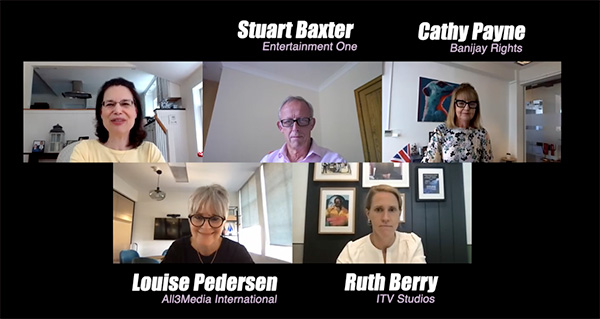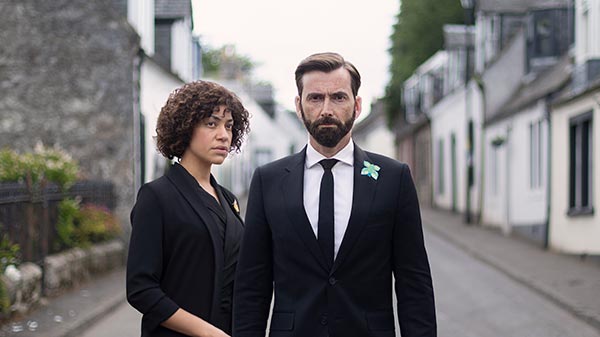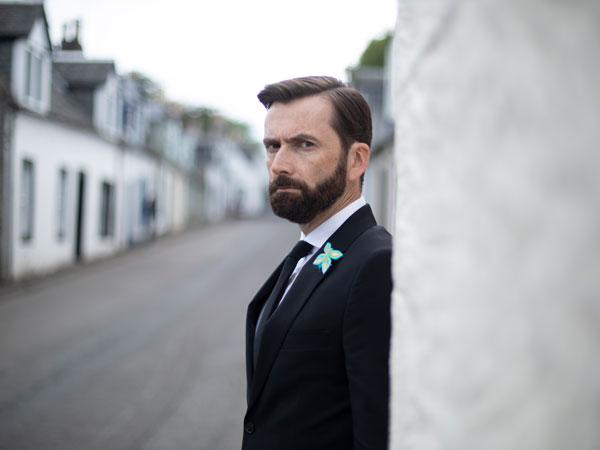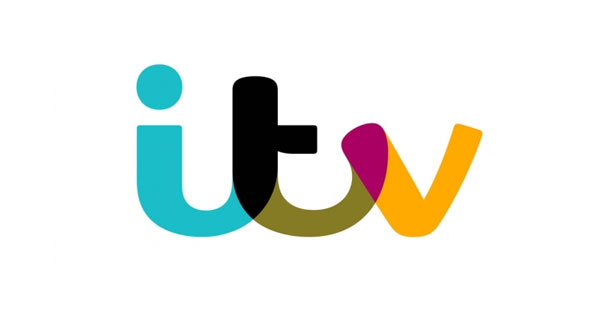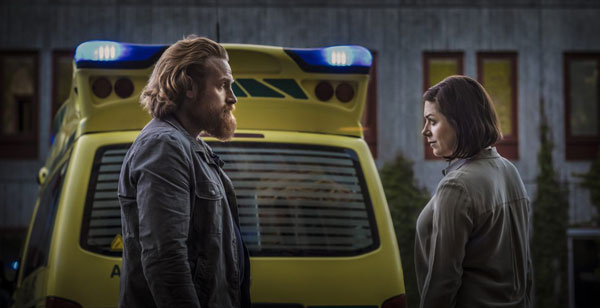
Demand for drama has been at an all-time high for the past few years, and Endemol Shine International (ESI) has positioned itself as a key supplier of the global market’s needs. Among its biggest successes in recent years are Broadchurch, Black Mirror, Peaky Blinders and Grantchester, and it arrives at MIPCOM with a diverse slate that includes Gunpowder and Cathedral of the Sea. As chief executive, Cathy Payne oversees sales teams on five continents. She talks to TV Drama about helping producers in the Endemol Shine Group finance and market their scripted series, and about working with SVOD platforms—not only as clients but also as co-production partners.
TV DRAMA: There is a lot of drama in the market right now. What has been ESI’s strategy with drama? What type of drama gets buyers’ attention?
PAYNE: I do think that there’s never been as much drama available in the marketplace as there is now, but in some ways, it’s still just as challenging to place drama. Sales overseas of American drama—broadcast-network series—have significantly fallen off. They’re not traveling as widely as they used to, and we’ve seen output deals stopped. The product is just not delivering. And there are so many other new outlets for drama in the U.S. trying to differentiate themselves by having specific subject matter that might appeal to the American audience, but it just doesn’t travel.
Buyers still want good broad-audience drama, and if you look at the shows that are performing best from the U.S., the good procedurals still work, so do the superhero shows, and the big fantasy and the big HBO and Showtime product does travel. Buyers are looking for what they don’t produce in their domestic market. For example, take relationship dramas; look at This Is Us on NBC. It’s a huge success; the numbers are unbelievable, but it just hasn’t worked overseas because people want relationship dramas [set in their own cultures]. People want something that they’re not going to get at home.
We’ve also seen streaming services open the world to different storytelling and, in particular, shorter runs. What the Americans refer to as “limited series,” which is what has always been produced in the U.K., allows you to package talent that would not normally do TV because they are not locked in for a long time. They can come in and out of limited series, and that is why TV has become the new film.
TV DRAMA: Are you seeing a difference between the type of drama that a linear channel will take, compared to what an SVOD platform will take?
PAYNE: Most free-to-air broadcasters will take a softer type of programming than a linear pay channel or an SVOD, so edgier, more niche shows are probably going to be on linear pay TV or SVOD services. In the U.K., you have a channel like BBC Two, and even though it’s free to air, it is more niche in its offering and can push the storytelling to what you wouldn’t normally see on a free-to-air broadcaster. When we look at our slate, our ITV dramas are more likely to sell to free-to-air broadcasters—the likes of Grantchester and The Good Karma Hospital—whereas Peaky Blinders and Tin Star are going to sell more to pay because of their content.
TV DRAMA: Do you work with various production companies within the Endemol Shine Group to help them finance their scripted projects?
PAYNE: We do that constantly. We are always going through their development slates looking at what’s coming up, what are the likely homes for their project, what the financing options are, and working out the ideal situation. Sometimes if we are doing a first-run deal with a global streaming company, they are going to take a large number of the rights and a holdback. That’s fine, as long we’re getting compensated properly for the rights. Sometimes that’s the right track. Sometimes there will be shows for which we think we’ll be able to bring in a partner or presale very early, while some projects don’t presell until a lot later. There is no clear rule, but what’s best is to talk about everything, and we do. I’ll give the production companies in the group feedback on the likely market potential of a project, potential buyers and any intelligence regarding any issues that need to be changed or adapted. We talk about casts that work, directors that work and lots of different things.
TV DRAMA: Are you also co-producing or co-financing with linear channels or SVOD services?
PAYNE: We announced Troy: Fall of a City, which will go out early in the new year. It’s our big production and the ultimate story of Troy. A lot of what you’ve seen on Troy deals with the city’s last days and the Trojan Horse story. This goes back to the beginning, when Paris is found after he was stolen away as a baby and raised by the wolves and then by another family. It’s for BBC One and is made at a budget level that is beyond what BBC One would usually do, so we needed to bring in a partner and Netflix is working with us. There are other shows for which we may not have a partner on board, but we might look for an enhanced presale, which involves less editorial input, as opposed to a co-production, which usually means co-financing from the beginning and sharing editorial decisions.
TV DRAMA: So the SVOD platforms are both distribution clients and potential co-production partners?
PAYNE: Yes. I would say they become more co-production partners as they mature. In the case of Netflix, it is taking fewer and fewer second runs. It might take the second run in a domestic market. For example, on Troy, they had a second run in the U.K. and first run everywhere else. But it’s really a co-production model where they are involved right from the outset. They do look at acquiring shows closer to when they are completed, but most of Netflix’s focus is having the first run in as many markets as possible. I don’t see them picking up much library anywhere. When they expanded their services to other territories, they looked at programming for which they had maybe 30 percent of the world and proceeded to acquire rights for the balance of the world. But they are a first-window player because they want to attract subscribers.
TV DRAMA: Are you also distributing non-English-language drama series?
PAYNE: We have a number of producers based around the world: Filmlance in the Nordic region as well as production businesses in the Netherlands, France, Germany and Spain. And yes, we do distribute their titles. Sometimes we need to finance those, bearing in mind where we feel those shows can sell. No doubt, and probably as a result of the streaming services, the market for non-English drama has increased. Years ago it would have been hard to see non-English in a number of the territories that are now airing it. But overall, the relative financial gain from non-English is much, much less than from English-language drama. But we do sell non-English and at MIPCOM, we’ve got one of our big dramas from Spain, Cathedral of the Sea, which is based on a novel of the same name. That is for Antena 3, and Netflix is involved as well as Televisió de Catalunya. We will launch the first window in Spain in the last part of the year.
TV DRAMA: Are you also making partnerships or first-look distribution deals with producers?
PAYNE: We are flexible in how we work. We’re a big group and we have product available internally. When we’re looking externally, we’ll be selective and think about what we need and when we need it to fill our gaps. But our doors are open, and we look at product all the time. When we invest, whether early or later on, would depend on the product, but we like to look at things as early as possible. If it’s something we’re really keen on, we’re more likely to get involved sooner rather than later.
TV DRAMA: At every market, there is a lot of attention given to new titles, but returning series are also important.
PAYNE: Peaky Blinders is back in this market for season four, and it launches very soon after MIPCOM. We also have season three of The Tunnel, which we make for Sky in the U.K., and that launches before the end of the year as well.
TV DRAMA: What other new dramas are you launching?
PAYNE: One of our new ones for this market is the three-part, 17th-century thriller Gunpowder. When people think of the Gunpowder Plot [that took place in London in 1605] they often think of a man called Guy Fawkes, who tried to blow up Parliament. What really drove it was that Catholics were being persecuted after the change of the Church of England. The man who was the mastermind behind the attempt, which was foiled—they were all caught before the act happened—went by the name of Robert Catesby. He had seen his land taken, his friends killed, he was a devout Catholic and he wanted to take a stand for what he believed in, but he was doing it through the use of violence. These same things are still going on in our world today. Gunpowder has a cracking cast: Kit Harington as Robert Catesby, Liv Tyler plays his cousin, Peter Mullan plays the most senior priest, and Mark Gatiss the king’s henchman. It airs on BBC One [in October].
And then we have a TV adaptation of a classic Australian movie, one of only two movies to ever screen twice at the Cannes Film Festival, Wake in Fright, which [was released in the 1970s] around the same time as Picnic at Hanging Rock and The Cars That Ate Paris. We have a 2×2-hour miniseries remake of Wake in Fright that is coming back for Channel Ten in Australia.
 TVDRAMA
TVDRAMA

